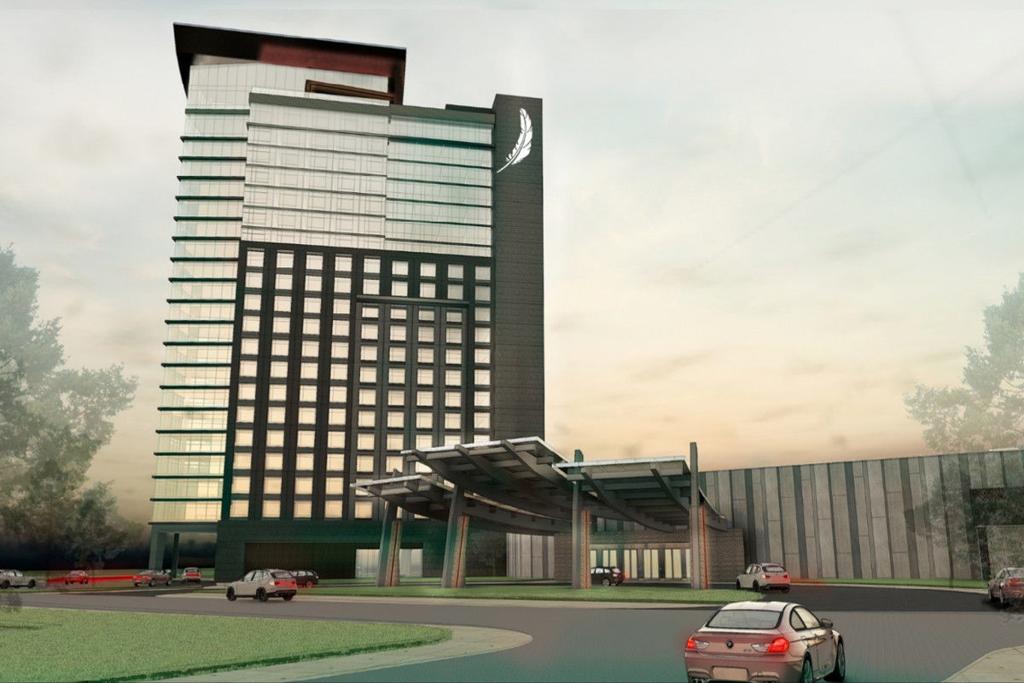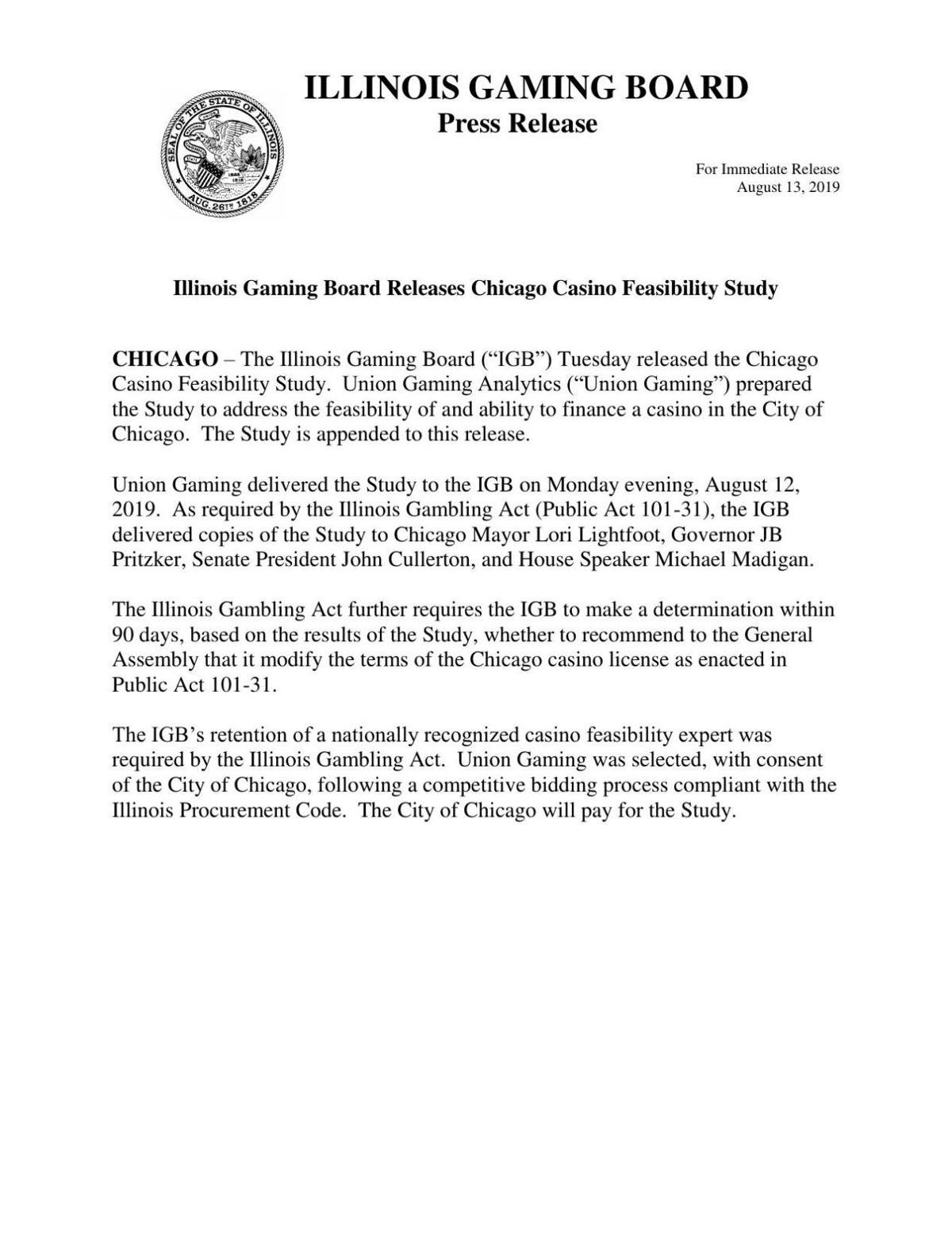Chicago Casino Feasibility Study
- Chicago Casino Feasibility Study Guidelines
- Chicago Casino Feasibility Study Questions
- Chicago Casino Feasibility Study Guides
None of the five potential sites for a casino in Chicago are “financially feasible” due to the current tax and fee structure in place in the city, a $120,000 study by Union Gaming Analytics for the Illinois Gaming Board has concluded.
The same feasibility study said the “onerous ” tax and fee structure in the gambling law — the highest nationwide — would make a Chicago casino “not financially feasible.”.
- A new study on the feasibility of a gambling casino in Chicago says the 'onerous' tax and fee structure will make it difficult, if not impossible, to attract an investor.
- Chicago’s first casino would struggle to make money because it would be the most highly taxed gaming operation in America, according to a feasibility study released Tuesday by the Illinois Gaming.
- A feasibility study released by the Illinois Gaming Board concluded that Chicago’s plan to build its first-ever casino will struggle to attract private investors and turn a profit.
- The conclusion of this feasibility study was that casino operators would not have an interest in investing in a casino resort in Chicago due to the hefty tax scheme. As per the recent gambling expansion bill in the state, the gaming revenue generated at this casino would effectively be subject to a tax rate of 72%.
The gaming expansion bill signed into law by Illinois Governor J.B. Pritzker in July allowed for the establishment of six new land-based casinos, including a major facility in Chicago. While such a facility could potentially become the highest-grossing casino in the state, the study said, high taxes would see it struggle to turn a profit.
The report released today (13 August) said the Chicago facility was not feasible because of a special privilege tax levied on the venue in return for the right to operate a casino in the city.
“We would also expect any such proposal to be dependent on either material changes to, or abatement of, the City of Chicago privilege tax of one third of adjusted gross receipts, and potentially the backwards-looking reconciliation fee,” the report said.
“While not all of the tax ‘savings’ would drop to the bottom line in the event the special privilege tax is rescinded, most of it would. In this scenario, and while the casino would certainly allocate some of the savings to, for example, increased marketing efforts, the lack of the special privilege tax would allow a casino to operate with margins broadly in line with the in-state peers.”
The five sites — four on the South side and one on the West side — were selected by the city of Chicago and visited by Union Gaming. The advisory firm reported that none of the sites were ideal, but ultimately ruled that regardless of location, the “the onerous tax and fee structure” in Chicago would be too large an obstacle to overcome.
“The current regulatory construct, namely the highest effective gaming tax and fee structure in the US makes any casino project – regardless of location – generally not financially feasible,” the study said.
According to the study, a casino in Chicago would have to pay a 39% tax on revenue in addition to a 33.3% privilege tax for operating in Chicago, culminating in an effective tax rate of 72%. Union Gaming examined the finances of other casinos in Illinois — which all reported earnings before interest, tax, depreciation and amortization between 19.2% and 26.7% — and in the rest of the US, concluding the privilege tax would be too much to make a Chicago casino profitable.
At the current tax rate, the study concluded that any Chicago casino make at best a 1-2% annual return, which the report stated would be too low a margin for any operator to conduct a successful business.
“We believe a reasonable casino developer would not move forward with a greenfield casino project that has, at best, a low single digit profit margin,” the study said.
The report added that even a casino structured to make a profit from non-gaming amenities would still be unlikely to make more than, “a few pennies on the dollar” and that a casino with these profit margins would be unlikely to obtaining financing.
The report did, however, state that a city-owned casino may be a possible solution.
The gaming expansion bill will also allow legal sports betting in Illinois, but the state gaming commission still needs to create a regulatory framework and a date for the first legal sports wagers remains unknown. Meanwhile, the neighbouring states of Iowa and Indiana are both set to have legal sports betting in place before the start of the NFL season. Among the casinos issued a temporary sports betting permit in Indiana is Ameristar Casino in East Chicago, located 5 miles from the Illinois border and 20 miles from downtown Chicago.
Related Articles
Illinois betting handle grows 42.4% in October
Illinois’ sports betting market grew once again in October, with amounts wagered up 42.4% month-over-month to $434.6m, and revenue jumped to $42.2m as the vertical’s…
PA sets new sports and igaming revenue records in November
Pennsylvania broke its sports betting and online gambling revenue records in November, though declining land-based revenue led to a year-on-year drop in the state’s monthly…
Discover more
After years of pushing a Las Vegas-style casino to boost tourism and much-needed revenue, Chicago's leaders seemingly hit the jackpot when Illinois lawmakers approved one as part of a massive gambling expansion.
But obstacles remain before anyone can place any bets. The city must persuade state lawmakers to vote on a plan that officials say makes the casino more profitable as well as choose a location, which already has sparked disputes.
Here's a look at the issues ahead.
The plan
Chicago is on track to become the largest U.S. city with a casino, and it's likely to be gigantic. Lawmakers approved up to 4,000 gambling positions, slots or table seats.
Though Chicago could use some positions for airport slots, a Chicago casino could rival those on the Las Vegas Strip. Caesars Palace and Aria have roughly 1,500 slots apiece.
The details -- including location and design -- are unknown. A required feasibility study in August evaluated five sites outside downtown, including a former U.S. Steel plant site, but recommended one closer to the city's core.
Mayor Lori Lightfoot says downtown is still in play. Sites often discussed include the state-owned James R. Thompson Center and an aging McCormick Place building.
Legislators also approved five other casinos, sports betting and more slots at horse tracks and Illinois' existing 10 casinos.
Democratic Gov. J.B. Pritzker signed the package into law during the summer as a critical funding source for a $45 billion capital plan. Chicago would use profits to pay down pension debt.
Payout problems
Chicago Casino Feasibility Study Guidelines
Revenue estimates vary. State experts agree the Chicago casino will easily outperform Rivers Casinos in Des Plaines, the state's highest-grossing casino, which generated $440 million last year with its 1,200 gambling positions. The feasibility study said one site at a former hospital could gross over $950 million by year five.
But there's a big hitch.
The same feasibility study said the 'onerous ' tax and fee structure in the gambling law -- the highest nationwide -- would make a Chicago casino 'not financially feasible.' The effective tax rate could be up to 72%, including a 33% tax on gross casino receipts that Chicago would use for police and fire pensions.
The one-third rate, which applies to Chicago and not the other casinos, was written into the plan after lawmakers rejected the idea of a city-owned casino.

The study concluded any casino operator's revenue would 'likely equate to a few pennies on the dollar.'
Legislators and city officials were negotiating fixes, but lawmakers adjourned their fall veto session without addressing the issue. State Rep. Bob Rita, a Blue Island Democrat who sponsored the expansion, introduced a city-backed plan to lower some taxes and fees but said lawmakers ran out of time for a vote.
Lightfoot said they'll pursue the issue in January.
'With so much potential on the line, our city and state deserve to get this done and get this done right,' she said.
The draw
Experts say casinos can have two major benefits for cities: economic growth and tax revenue.
Chicago leaders have long found both ideas alluring.
Chicago Casino Feasibility Study Questions
Former Mayor Richard M. Daley floated a plan in the early 1990s for a $2 billion city-owned casino complex that would feature family-friendly entertainment. Former Mayor Rahm Emanuel pushed proposals to address the city's financial woes.
Lightfoot has favored a casino as a way to boost economically depressed neighborhoods and to bring long-term financial stability. The city council recently approved her proposed $11.65 billion budget, which relies on several one-time funding sources including $215 million from debt refinancing.
The opposition
Not everyone is on board, particularly with the social cost.
Illinois Church Action on Alcohol & Addiction Problems, a nonprofit, said casinos 'prey on the poor and enable -- if not tacitly encourage -- gambling addiction.'
Some neighborhoods also don't want to profit off casino dollars. An alderwoman whose ward covers one proposed site in a historically black neighborhood slammed the idea as akin to 'putting a casino in Harlem.'
The Illinois Gaming Association worries about oversaturation with the expansion. The new casinos will be in the South suburbs, Waukegan, Danville, Rockford and southern Illinois.

Chicago Casino Feasibility Study Guides
Former Gov. Pat Quinn vetoed two gambling expansions over concerns about ethics and school funding.
There are also doubts about the feasibility study, conducted by a Las Vegas consultant.

Michael Wenz, a Northeastern Illinois University economics professor, said he's not convinced a Chicago casino wouldn't be profitable even with the current tax structure and bidding developers should be able write proposals without impediment.
The competition
Illinois isn't the only state trying to win big.
Indiana Gov. Eric Holcomb signed a plan this year that will, among other things, allow two Gary casino boats on Lake Michigan to move to land sites and help open another casino in Terre Haute. He said Gary -- 30 miles from Chicago -- would 'absolutely' compete with Illinois casinos.
'It will be on a perfect thoroughfare, and I predict that we'll exceed expectations as they are right now,' Holcomb said over the summer.
Rockford officials have also kept a close eye on the Wisconsin border with plans underway for a $405 million casino in Beloit.
What's ahead
Even without the legislative delays, a ribbon cutting is a while away.
The Illinois Gaming Board has a year to review applications and conduct background checks before issuing licenses. In Chicago, there'll have to be local location approval and public hearings. Then construction can begin.
'Gaming is a very complicated issue and it always has been,' Rita said. 'Everybody wants to get it up and running right away and make sure they do it right.'